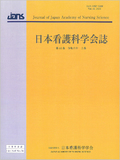Japanese
English
- 販売していません
- Abstract 文献概要
- 参考文献 Reference
要旨
目的:急性期病院看護師による後期高齢患者のインフォームドコンセント(Informed Consent:IC)に関わるアドボカシー実施状況と関連要因を明らかにすること.
方法:急性期病院4施設の看護師485名を対象とし,看護師の患者アドボカシー概念に基づく治療選択における意思決定支援力測定尺度得点の関連要因を重回帰分析にて検討した.
結果:有効回答は295名,尺度合計得点平均値は67.6±8.9点であった.有意な関連を示した要因は,心理的安全性,個別的ケアの意識,IC時の同席,専門資格の4つであった.
結論:後期高齢患者のアドボカシー実施には,心理的安全性が高いこと,個別的ケアを意識している程度が高いこと,IC時の同席頻度が高いこと,専門資格を保有していること,以上4つの要因が影響していた.
Objective: We examined the status of acute care hospital nurses' advocacy regarding the informed consent(IC) of patients aged 75 years or over and its factors, including psychological safety.
Methods: The participants were 485 nurses who were working in four acute care hospitals. We used a measurement scale for shared decision-making in treatment based on the concept of patient advocacy in nursing(scale). Multiple regression analysis was conducted to investigate the factors.
Results: Valid responses were obtained from 295 nurses(response rate: 60.8%). The mean total score of scale was 67.6(SD = 8.9). Four factors were identified: psychological safety, awareness of individualized care, being present during IC, and having professional qualifications.
Conclusion: To further advocate regarding IC for patients aged 75 years or over more effectively, four elements are important; the improvement of psychological safety; the recognition of individualized care; an improvement in IC attendance rates and possess professional qualifications.
Copyright © 2024, Japan Academy of Nursing Science. All rights reserved.


